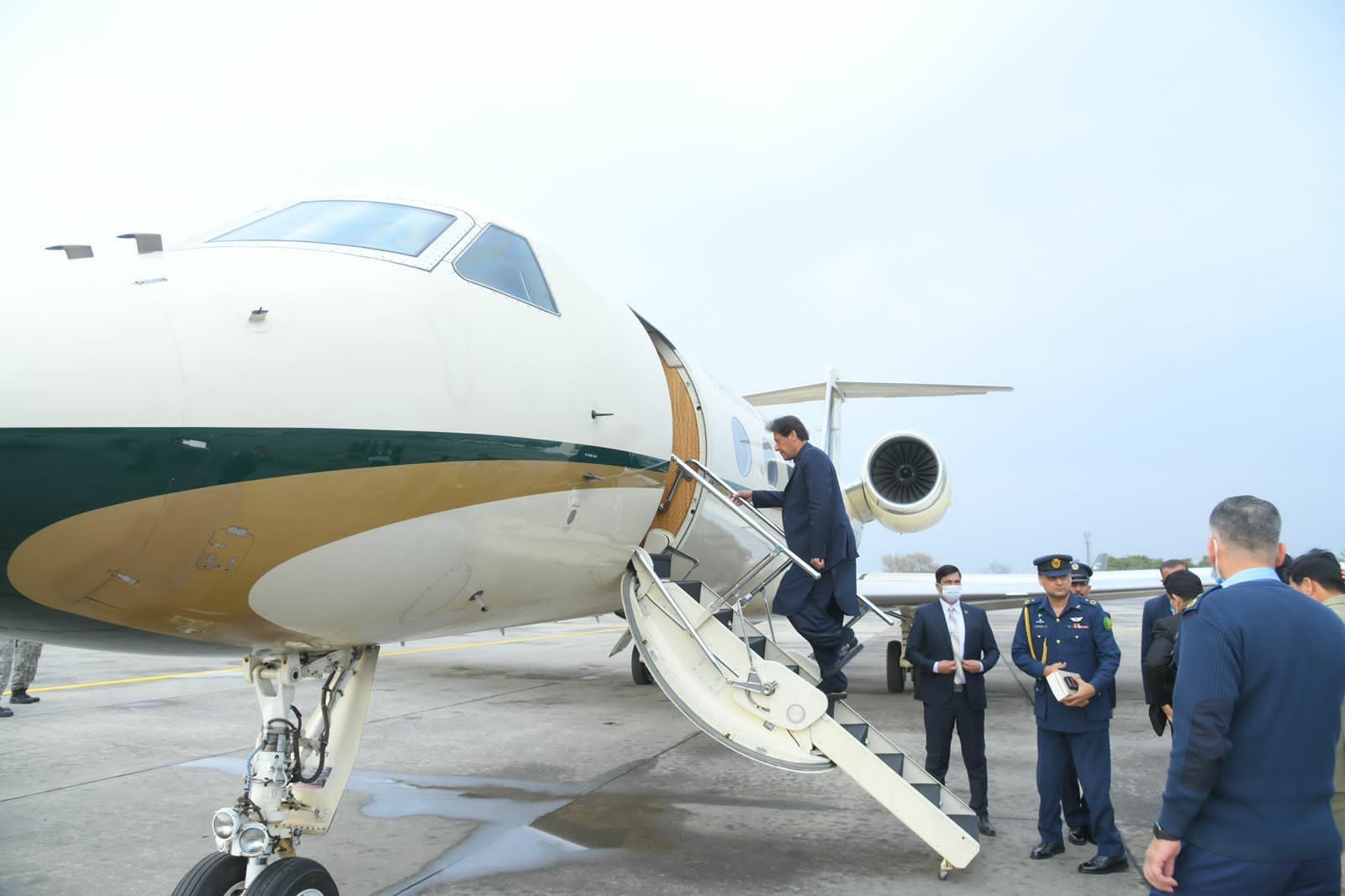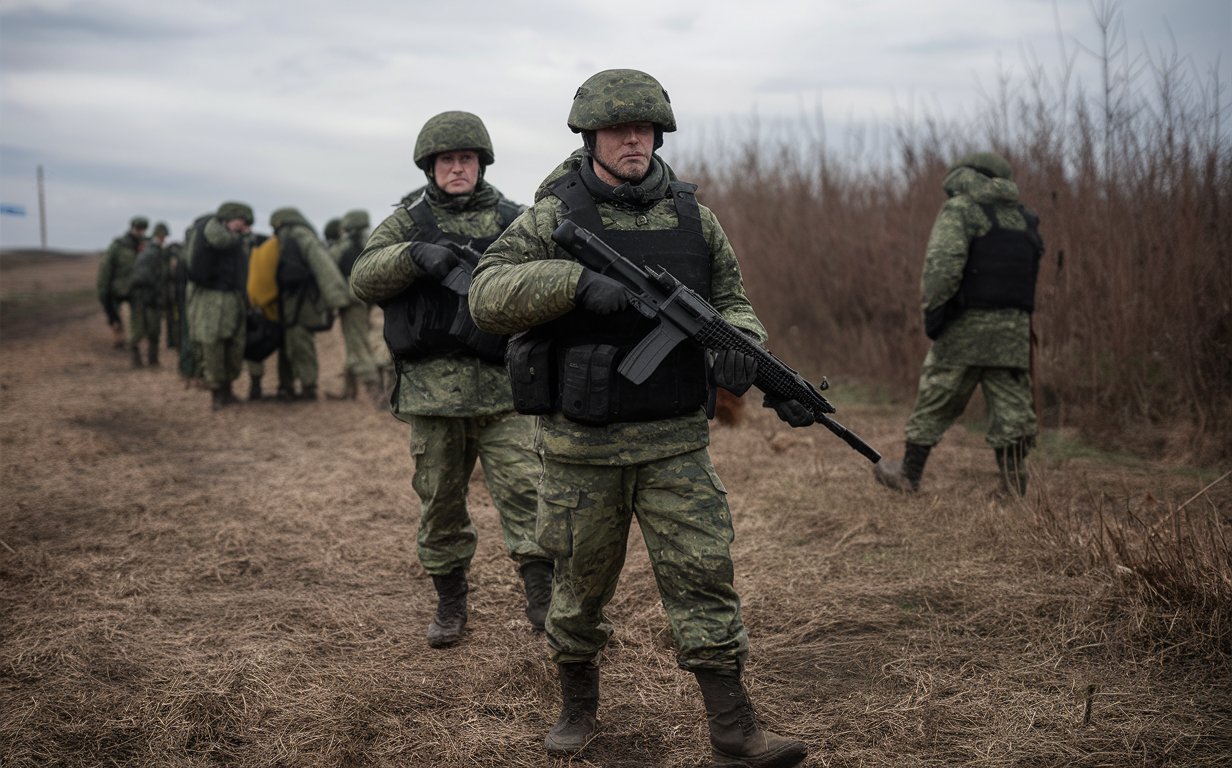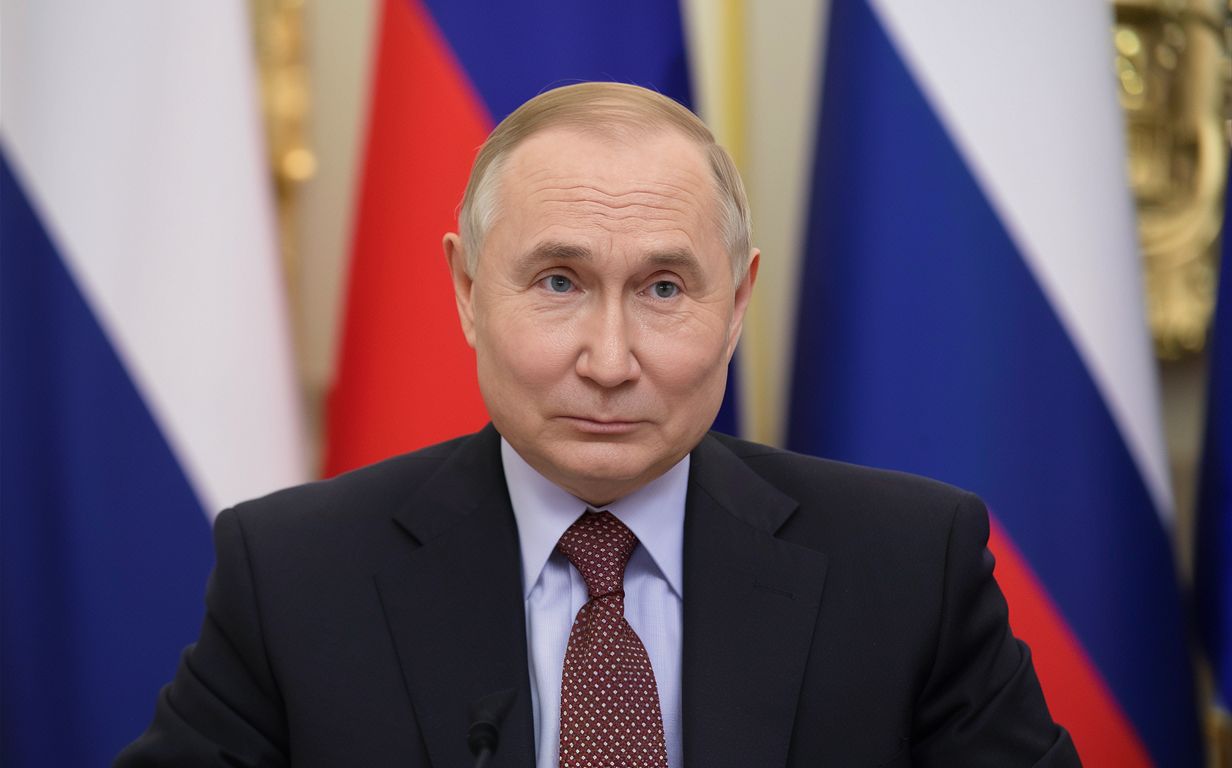Russia
PM Imran departs for two-day ‘historic’ visit to Russia amid Ukraine Crisis

Premier to meet Russian President Vladimir Putin among other officials, Agenda includes pushing for construction of long-delayed, multi-billion-dollar gas pipeline
Prime Minister Imran Khan departed on Wednesday for a two-day visit to Russia during which he will hold bilateral meetings with President Vladimir Putin and other officials. A delegation of ministers is also accompanying the premier.
Pakistan Tehreek-e-Insaf (PTI) Senator Faisal Javed Khan called the visit historic and a game-changer. “This is historic as it’s the first visit to Russia by any Pakistani Prime Minister in 23 years. Khan-Putin meeting is scheduled for Thursday,” the senator stated in a Twitter post.
“Wide-ranging exchange of views on major regional and international issues, including Islamophobia and the situation in Afghanistan will be discussed during PM Imran’s meeting with President Putin.
During the visit, PM Imran is also expected to push for the construction of a long-delayed, multi-billion-dollar gas pipeline to be built in collaboration with Russian companies.
Khan’s trip to meet President Vladimir Putin and discuss issues including economic cooperation comes hours after a number of Western nations hit Russia with new sanctions for its military deployment into parts of eastern Ukraine.
It is pertinent to mention here that PM Imran’s two-day visit was planned before the current crisis over Ukraine.
“Both countries are eager to launch the project at the earliest,” Pakistan’s energy ministry spokesman told Reuters about the Pakistan Stream gas pipeline.
The 1,100 km (683 miles)-long pipeline, also known as the North-South gas pipeline, was initially agreed to in 2015 and was to be financed by both Moscow and Islamabad, using a Russian company to construct it.
It is unclear how the latest sanctions will affect the project, which would deliver imported Liquified Natural Gas (LNG) from Karachi on the Arabian Sea coast to power plants in the northeastern province of Punjab.
The project is important for Pakistan – particularly the power sector – as the country’s dependence on imported LNG grows in the face of dwindling indigenous gas supplies.
The pipeline project has already suffered delays because of earlier sanctions.
In an interview ahead of his trip, Khan had expressed concern about the situation in Ukraine and the possibility of new sanctions and their effect on Islamabad’s budding cooperation with Moscow.
Relations between Pakistan and Russia were minimal for years as Islamabad sided with the United States in the Cold War and was given Major Non-NATO Ally status by Washington after US forces invaded Afghanistan in 2001.
In recent years, however, relations between the United States and Pakistan have deteriorated and there has been thawing between Moscow and Islamabad, which has seen the planning of projects in the gas and energy fields.
In an interview published on Monday, Khan played down the timing of the visit, and any effect it would have on Pakistan’s relations with the West.
“This visit was planned well before the emergence of the current phase of Ukrainian crisis … I received the invitation from President Putin much earlier,” he told Newsweek Pakistan.
Last week, Federal Minister for Information and Broadcasting Fawad Chaudhry termed Prime Minister Imran Khan’s visit to Russia a “game-changer” for bilateral relations of the two countries.
“It will be a great and game-changer visit, and by the grace of Allah, the Almighty, now after China, Pakistan’s relations with Russia are going to get further strengthened,” he said while addressing media.
Analysis
Urgent Weapons Aid to Ukraine: Analyzing the $1 Billion Pentagon Package and Its Impact on the Conflict and Geopolitical Landscape

Introduction
To strengthen Ukraine’s defense capabilities, the Pentagon has swiftly sent $1 billion worth of weaponry to Kyiv after President Biden signed an aid bill. The need for military aid is driven by the recent challenges faced by Ukrainian troops on the front lines. This article seeks to explore the implications of this aid package, its effect on the ongoing conflict, and the wider geopolitical ramifications.
Ukraine’s Military Struggles
Ukrainian forces have been grappling with intensified Russian aggression, resulting in significant casualties and territorial losses. The conflict, which began in 2014, has seen a resurgence in recent months, with Russian-backed separatists intensifying their offensive in eastern Ukraine. The Ukrainian military has been outgunned and outmanned, leading to the urgent need for military assistance from the United States and its allies.
The $1 Billion Aid Package
The $1 billion aid package approved by the U.S. Congress and signed by President Biden is a testament to the United States’ commitment to supporting Ukraine in its defense against Russian aggression. The package includes a range of weapons and military equipment, such as Javelin anti-tank missiles, artillery systems, and ammunition. The urgency to deliver these weapons to Ukraine reflects the dire situation on the ground and the need for immediate support.
Impact on the Conflict
The provision of advanced weapons systems to Ukraine is expected to significantly enhance its military capabilities, enabling it to better counter Russian-backed separatists’ offensives. The Javelin anti-tank missiles, in particular, have been hailed for their effectiveness in neutralizing Russian armor. The artillery systems and ammunition included in the aid package will also bolster Ukraine’s ability to defend its territory and potentially launch counter-offensives.
Geopolitical Consequences
The delivery of $1 billion in weapons to Ukraine is not without broader geopolitical implications. It marks an escalation in the United States’ involvement in the conflict, potentially straining its relations with Russia. The move also underscores the United States’ commitment to upholding international norms and defending democratic values, as Ukraine continues to fight for its territorial integrity and democratic governance.
Expert Opinions
According to John Herbst, a former U.S. ambassador to Ukraine and current director of the Eurasia Center at the Atlantic Council, the aid package is a “critical step” in supporting Ukraine’s defense efforts. He further stated that “these weapons will help Ukraine defend itself and deter further Russian aggression.”
However, not all experts share this optimistic view. Some argue that the provision of military aid could further inflame the conflict, potentially leading to a wider confrontation between the United States and Russia. Dmitri Trenin, director of the Carnegie Moscow Center, cautions that “the U.S. decision to supply Ukraine with weapons will only exacerbate tensions between Washington and Moscow.”
Conclusion
The Pentagon’s rapid delivery of $1 billion in weapons to Ukraine reflects the urgent need to support Ukrainian troops in their struggle against Russian-backed separatists. The aid package has the potential to significantly enhance Ukraine’s military capabilities, bolstering its ability to defend its territory and potentially launch counter-offensives. However, the move also carries broader geopolitical implications, potentially straining U.S.-Russia relations and raising the specter of a wider conflict. As the situation unfolds, it is crucial for policymakers and analysts to closely monitor the impact of this aid package and its implications for the ongoing conflict and the broader geopolitical landscape.
News
Russian Troops Advance: Ukraine’s Eastern Cities Brace for Impact

As Russian troops continue to advance towards Ukraine’s eastern cities, frontline communities are bracing themselves for the worst. With Moscow’s forces slowly pressing forward, life is draining out of these cities, leaving residents anxious and uncertain about what the future holds.

The situation in Ukraine’s eastern cities has been tense for years, with sporadic fighting between Ukrainian government forces and Russian-backed separatists. However, the recent escalation of violence has raised concerns that the conflict could spiral out of control, leading to a full-scale war between Ukraine and Russia.
Despite calls for a peaceful resolution to the conflict, tensions remain high as Russian troops continue to move towards Ukraine’s border. As the situation continues to unfold, residents of Ukraine’s eastern cities are left to wonder what the future holds for them and their families.
Table of Contents
Russian Military Advances

Moscow’s Strategy
The Russian military has been slowly advancing towards eastern cities in Ukraine, with Moscow’s forces pressing forward with a clear strategy in mind. The Russian government has claimed that they are only protecting Russian-speaking citizens in the region, but many experts believe that the ultimate goal is to annex the territory and expand Russian influence in the region.
One of the key tactics used by Moscow is the deployment of so-called “little green men” – Russian soldiers without insignia – to stir up unrest and create chaos in the region. This has been seen in previous annexations by Russia, including the annexation of Crimea in 2014.
Frontline Dynamics
As Russian troops advance, life is draining out of frontline communities in Ukraine. The situation is particularly dire in cities such as Donetsk and Luhansk, which have been at the center of the conflict since 2014. The ongoing violence has caused significant damage to infrastructure and has forced many residents to flee their homes.
The Ukrainian military has been fighting back against the Russian advance, but they are facing significant challenges. The Russian military is well-equipped and well-trained, and they have a clear advantage in terms of firepower. As a result, the Ukrainian military has been forced to resort to guerrilla tactics, including hit-and-run attacks on Russian convoys.
The situation in eastern Ukraine remains tense, with both sides continuing to engage in sporadic fighting. The international community has condemned Russia’s actions and has called for a peaceful resolution to the conflict, but it remains to be seen whether this will be possible.
Impact on Eastern Ukrainian Cities

As Russian troops continue to advance, the eastern cities of Ukraine are bracing for the worst. The slow but steady progress of Moscow’s forces is taking a heavy toll on the communities closest to the frontlines.
Civilian Challenges
The impact on civilians in these cities is significant. Many are living in fear of the violence that could erupt at any moment, with some already forced to flee their homes in search of safety. The ongoing conflict has disrupted essential services such as healthcare, education, and transportation, leaving residents struggling to meet their basic needs.
The threat of violence has also taken a toll on the mental health of those living in these communities. The constant fear and uncertainty have led to increased levels of stress and anxiety, making it difficult for people to go about their daily lives.
Economic Consequences
The economic consequences of the conflict are also severe. The ongoing violence has disrupted trade and commerce, leading to a sharp decline in economic activity. Many businesses have been forced to close, leaving thousands of people without work.
The disruption of essential services has also had a significant impact on the local economy. Healthcare facilities, schools, and transportation networks have all been severely affected, making it difficult for businesses to operate and for people to access the services they need.
Overall, the situation in eastern Ukraine is dire. With Russian troops continuing to advance, the future of these communities remains uncertain. The international community must act quickly to provide assistance and support to those affected by the conflict, and to work towards a peaceful resolution to the ongoing crisis.
International Responses

Diplomatic Efforts
The international community has expressed concern over the escalating conflict between Ukraine and Russia. The United Nations Security Council held an emergency meeting to discuss the situation and called for an immediate de-escalation of tensions. The European Union has also urged Russia to withdraw its troops and engage in dialogue with Ukraine.
In addition, several countries, including the United States, Canada, and the United Kingdom, have pledged their support to Ukraine. The US has promised to provide military aid to Ukraine, while Canada has announced sanctions against Russia.
Sanctions and Aid
The European Union has imposed economic sanctions on Russia in response to its actions in Ukraine. The sanctions target key sectors of the Russian economy, including energy, finance, and arms exports.
The EU has also provided financial aid to Ukraine to support its economy and help it deal with the humanitarian crisis caused by the conflict. The United States has also provided financial aid to Ukraine, as well as military assistance.
Overall, the international community is working to find a diplomatic solution to the conflict and support Ukraine in its efforts to defend its sovereignty and territorial integrity.
Future Projections

As the Russian troops continue to advance towards Ukraine’s eastern cities, the future looks uncertain for the frontline communities. The ongoing conflict has already caused significant damage to the region’s infrastructure, and the situation is likely to worsen as the fighting intensifies.
One of the major concerns is the impact on the local economy. The region’s industries, including mining and agriculture, have already been hit hard by the conflict, and the continued presence of Russian troops is likely to further disrupt trade and investment. This could lead to rising unemployment and a decline in living standards for those living in the affected areas.
There are also concerns about the humanitarian situation in the region. As the conflict intensifies, more and more people are being displaced from their homes, and many are struggling to access basic necessities such as food, water, and medical care. The ongoing violence is also taking a toll on the mental health of those living in the affected areas, with many experiencing trauma and anxiety.
In the coming months and years, it is likely that the situation in Ukraine’s eastern cities will remain volatile and unpredictable. The international community must work together to find a peaceful resolution to the conflict and provide support to those affected by the ongoing violence. Only through cooperation and dialogue can we hope to bring an end to this devastating conflict.
Analysis
The Global Impact of Vladimir Putin’s 2024 Election Victory: A Deep Dive into Russia’s Future Role on the World Stage

Introduction
The recent 2024 Russian elections saw Vladimir Putin secure another term as President, marking his fourth consecutive term in office. This victory has sparked a wave of speculation and analysis about what it means for both Russia and the international community. Putin’s win is likely to have significant implications, particularly on a global scale.
Some analysts believe that Putin’s continued leadership will result in an even more assertive foreign policy, while others argue that it could lead to increased tensions with the West. It remains to be seen how Putin’s victory will shape the political landscape in Russia and beyond, but it will have far-reaching consequences.

Table of Contents
Putin’s Continued Leadership
With Vladimir Putin’s re-election as the President of Russia, the country is set to maintain its current trajectory under his leadership. This continuity brings both stability and predictability to Russian domestic and foreign policies, influencing how the country engages with the world. Putin’s re-election also signals the continuation of his assertive foreign policy, which has been marked by increased tensions with the West. However, this predictability could also provide opportunities for international cooperation with Russia on issues such as regional security and counter-terrorism efforts.
Geopolitical Dynamics
The victory of Vladimir Putin in the presidential elections has far-reaching implications for global geopolitics. Russia’s assertive foreign policy, especially in regions like Eastern Europe and the Middle East, is likely to persist. This could lead to potential changes in existing power dynamics and international relations, leading to shifts in alliances and conflicts. It remains to be seen how other countries will respond to this shift, and whether it will have a significant impact on the balance of power in the world.
Economic Considerations
The Russian economy is known for its close ties to political stability. With Putin’s recent win, many investors and businesses operating in or with Russia may feel a sense of continuity. However, it’s important to keep an eye on certain factors such as economic diversification, sanctions, and energy dependence. These concerns will likely continue to play a significant role in shaping the future of the Russian economy in the coming years.
International Relations
The recent re-election of Vladimir Putin as the President of Russia is expected to have a significant impact on the country’s relationships with other nations. The West, in particular, will need to carefully navigate its interactions with Russia led by Putin for an extended period. This could have implications for several important issues, including arms control, cybersecurity, and regional conflicts. As such, we will likely continue to see a great deal of attention paid to Russia and its foreign policy decisions in the years ahead.
Human Rights and Democracy
Critics have raised concerns about human rights abuses and democratic backsliding under Putin’s rule. His victory may further embolden authoritarian tendencies within Russia and set a precedent for similar actions in other parts of the world.
Global Security
Russia plays a crucial role in global security issues such as nuclear proliferation, counterterrorism, and cybersecurity. Putin’s continued leadership will influence how these challenges are addressed on the international stage.
Conclusion
The victory of Vladimir Putin in the 2024 Russian elections carries far-reaching implications for global politics, economics, and security. As we look ahead, understanding these implications will be crucial for policymakers, analysts, and citizens around the world to navigate the evolving landscape shaped by Russia’s continued presence under Putin’s leadership.
-

 Featured3 years ago
Featured3 years agoThe Right-Wing Politics in United States & The Capitol Hill Mayhem
-

 Elections 20242 months ago
Elections 20242 months agoAnalyzing Trump’s Super Tuesday Triumph and Nikki Haley’s Strategic Moves
-

 News2 years ago
News2 years agoPrioritizing health & education most effective way to improve socio-economic status: President
-

 China3 years ago
China3 years agoCoronavirus Pandemic and Global Response
-

 Canada3 years ago
Canada3 years agoSocio-Economic Implications of Canadian Border Closure With U.S
-

 Conflict3 years ago
Conflict3 years agoKashmir Lockdown, UNGA & Thereafter
-

 Democracy3 years ago
Democracy3 years agoMissing You! SPSC
-

 Democracy3 years ago
Democracy3 years agoPresident Dr Arif Alvi Confers Civil Awards on Independence Day

























